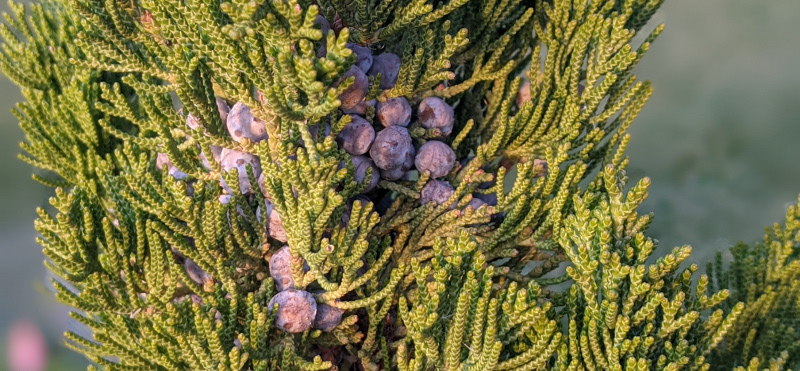Juniper berries have been used for flavoring alcoholic beverages such as gin for hundreds of years. These berries are fleshy cones that resemble berries. There are numerous varieties of juniper. Do not eat juniper unless you can positively identify the species because not all of them are safe to eat.

Juniperus communis is the variety typically used for flavoring. The berries produced by Juniperus sabina and Juniperus oxycedrus are toxic. Only consume berries from juniper plants that you can positively identify.
The entire juniper plant contains Savin oil which is harmful to the kidneys even in small doses. Prolonged ingestion can cause severe kidney damage.
Are Juniper Poisonous to Children
Consuming juniper is not recommended for toddlers and children. Eating the berries may cause illness with symptoms of vomiting or diarrhea.
Are Juniper Poisonous to Dogs
Juniper berries, needles, and stems are all classified as being minor toxic to dogs and puppies. Eating juniper will most likely not be fatal, but it will make your dog sick. Common symptoms are vomiting or diarrhea.
Are Juniper Poisonous to Cats
Ingesting any part of juniper plants will cause severe abdominal pain to cats.
Are Juniper Poisonous to Other Animals
Juniper is not recommended for consumption by horses, pigs, goats, or chickens. Fortunately, juniper is not tasty, so most animals will avoid eating it.
Symptoms of Juniper Poisoning
Always check with your doctor or veterinarian for guidance if you suspect juniper poisoning. Here are some common symptoms to look out for:
- Vomiting
- Diarrhea
To prevent anything negative from happening in the first place, you can use physical barriers such as decorative fencing to prevent children or animals from getting too close for a taste. Dogs and cats can sometimes suffer from a nutrient deficiency. If they continually gnaw on certain things, it might be time for a thorough check-up from your vet to check on your pet's health. There are also animal deterrent products on the market that can help prevent animals from chewing on plants.
Pet Poison Helpline
If something were to happen to your furry friend, and you suspect that they are suffering from juniper poisoning, there is a poison control hotline to call for 24/7 vet advice. It is called the Pet Poison Hotline, and their phone number is (855) 764-7661.
Click here for a complete list of Pet Safe Plants.
Sources:
"Juniper as forage: an unlikely candidate." Texas Natural Resources Servertexnat.tamu.edu/
"Juniper Berry." Wikipedia. en.wikipedia.org
 |
Author Erica Browne Grivas - Published 11-15-2021 |


